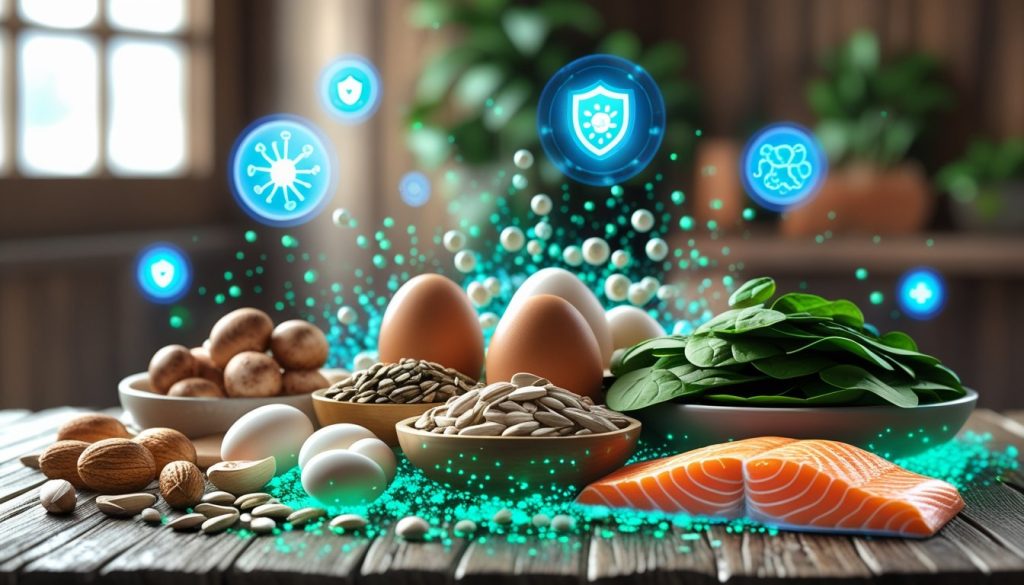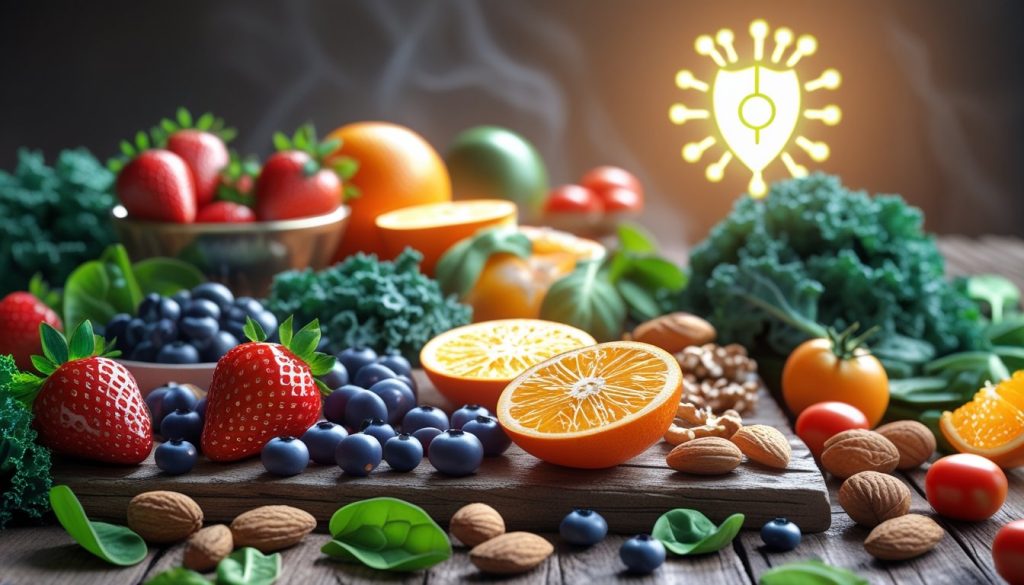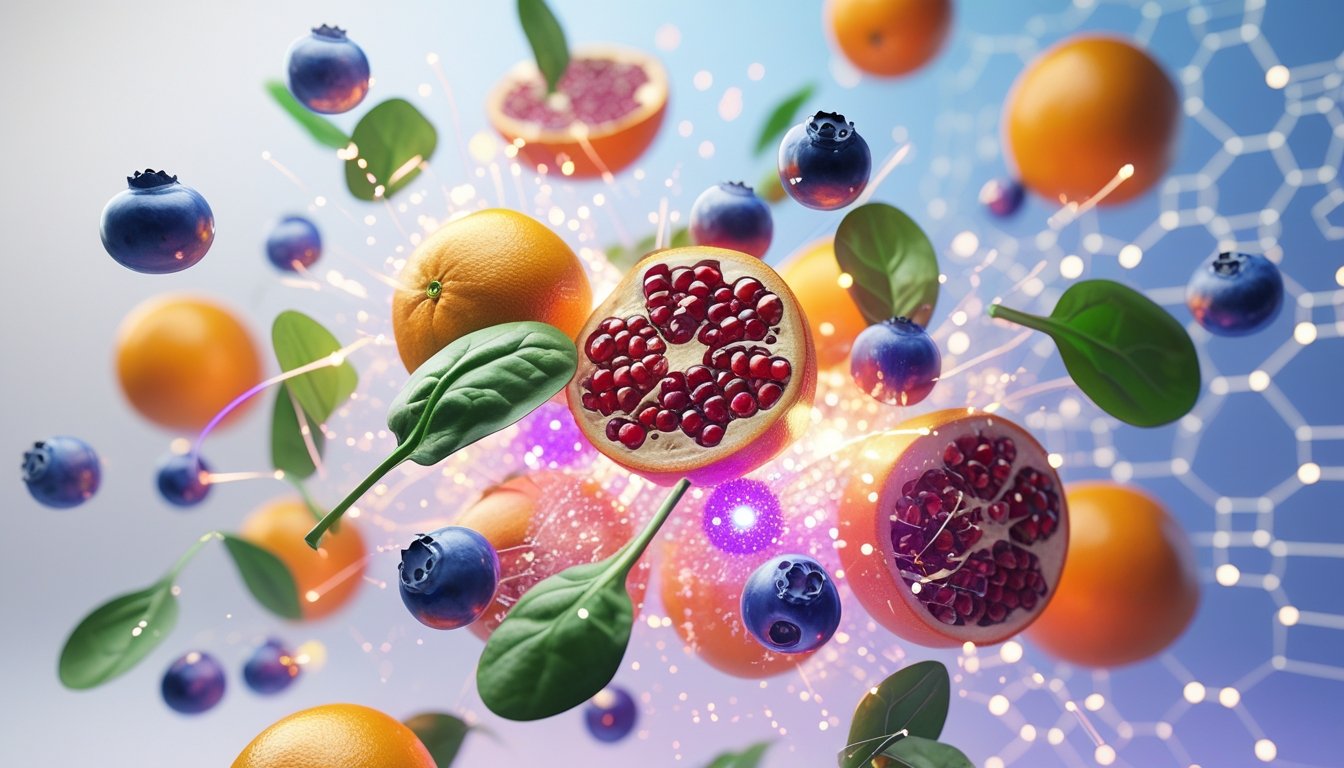Essential Antioxidant Secrets: Antioxidants boost immune system function by neutralizing harmful free radicals and supporting cellular defense mechanisms throughout your body. These powerful compounds serve as your body's natural shield against oxidative stress, inflammation, and various pathogens that threaten your health daily113.
Understanding how specific antioxidants work can transform your approach to maintaining optimal immune function and overall wellness. Your immune system operates as a sophisticated network of cells, tissues, and organs working together to defend against harmful invaders.
When this system becomes compromised due to oxidative stress, poor nutrition, or environmental factors, your body becomes more susceptible to infections and chronic diseases814. Fortunately, incorporating the right antioxidants into your daily routine can significantly enhance your immune response and protect against illness.
The Science Behind Antioxidants and Immune Function
Reactive oxygen species (ROS) play a crucial role in the development of numerous diseases, including atherosclerosis, diabetes, and cancer1. When free radical production exceeds your body's antioxidant capacity, oxidative damage occurs to vital cellular components including proteins, lipids, and DNA15. This imbalance triggers pro-inflammatory responses and increases inflammatory cytokines, making oxidative stress control essential for preventing degenerative diseases.
Antioxidants work by counterbalancing reactive oxygen species and stabilizing free radicals through electron donation, helping maintain cellular homeostasis15. This process allows your immune system to focus on eliminating external threats rather than managing internal oxidative damage9. Research demonstrates that adequate antioxidant status promotes enhanced immune cell function, stronger vaccine responses, and more robust immunity against pathogens4.
How Oxidative Stress Impacts Immunity
Poor nutrient status frequently associates with inflammation and oxidative stress, which directly impacts immune system performance8. When your body lacks sufficient antioxidants, immune cells become overwhelmed by free radical damage, reducing their effectiveness against infections and diseases. This creates a cascade effect where compromised immunity leads to increased susceptibility to illness, further depleting antioxidant reserves.

Essential Antioxidant #1: Vitamin C – The Immunity Powerhouse
Vitamin C stands as one of the most powerful players in the antioxidant world, positively affecting virtually every aspect of your immune system3. This water-soluble vitamin supports natural killer cells that eliminate infectious and malignant targets, neutrophils that fight bacterial infections, antibodies that identify and destroy invading threats, and lymphocytes that produce antibodies3.
Controlled trials consistently demonstrate vitamin C's capacity to reduce the severity and duration of respiratory tract infections, especially the common cold3. Since your body cannot produce vitamin C naturally, maintaining adequate levels through diet or supplementation becomes crucial for optimal immune function.
Best Food Sources of Vitamin C
Load up on citrus fruits, bell peppers, strawberries, broccoli, and tomatoes to maximize your vitamin C intake3. Iron helps enhance vitamin C absorption, so consider pairing your vitamin C-rich foods with quinoa, spinach, or beans for optimal bioavailability3. This strategic combination ensures your body can effectively utilize this essential antioxidant for immune support.
Essential Antioxidant #2: Vitamin E – Fat-Soluble Protection
Vitamin E serves as a vital nutrient for immune system function due to its role as a fat-soluble antioxidant5. This vitamin concentrates in cell membranes throughout your body, including immune system cells rich in polyunsaturated fatty acids, helping strengthen overall immunity5. Vitamin E works synergistically with other antioxidant nutrients to reduce adverse effects of polyunsaturated fatty acids and maintain cellular integrity.
Research shows vitamin E enhances natural killer cell activity, supports lymphocyte production and function, increases interferon production, and aids in macrophage removal15. These mechanisms make vitamin E essential for both innate and adaptive immune responses.
Incorporating Vitamin E Into Your Diet
Vegetable oils, nuts including almonds and peanuts, seeds, grains, and avocado provide excellent sources of vitamin E515. Regular consumption of these foods ensures adequate vitamin E levels for optimal immune function and cellular protection against oxidative damage.
Essential Antioxidant #3: Selenium – The Immune Modulator
Selenium functions as an essential micronutrient that plays vital roles in various physiological processes and immune system function4. This trace mineral exerts biological effects through incorporation into selenoproteins throughout your body. Optimum selenium status promotes enhanced T cell proliferation, natural killer cell activity, and innate cell functions while supporting stronger vaccine responses and robust immunity against pathogens4.
Studies demonstrate that selenium supplementation modulates inflammatory responses in respiratory distress syndrome patients by restoring lung antioxidant status and suppressing IL-1β and IL-6 levels4. Selenium supplementation also suppresses pathogen-induced activation of NF-κB and downstream pro-inflammatory cytokine release4.
Selenium's Antiviral Properties
The antiviral properties of selenium are mediated through its antioxidant effects4. Selenium-deficient individuals tend to present with diminished antioxidant glutathione peroxidase activity, while supplementation improves CD+ T cell counts and enhances glutathione peroxidase and other antioxidant selenoenzymes along with catalase activities4.

Essential Antioxidant #4: Zinc – The Immune Cell Developer
Zinc proves essential for the development and function of immune cells throughout your body2. This mineral supports the production and activity of white blood cells, which serve as crucial components of your immune defense system. Adequate zinc levels help ensure proper immune cell communication and response to threats.
Zinc deficiency has been associated with increased infection risk, making adequate intake vital for maintaining strong immunity8. This mineral also helps with iron absorption, creating synergistic effects when consumed together with iron-rich foods2.
Zinc Food Sources and Benefits
Shellfish, whole grains, nuts, dark chocolate, and fortified cereals provide excellent zinc sources2. Regular consumption of these foods helps maintain optimal zinc levels for immune cell development and function.
Essential Antioxidant #5: Beta-Carotene and Vitamin A
Beta-carotene serves as a powerful antioxidant and precursor to vitamin A, providing robust defenses against invading pathogens3. This nutrient particularly supports lymphocytes following exposure to free radicals and may increase production of important immune defenders including B and T cells3.
Your body converts beta-carotene into vitamin A, which plays pivotal roles in protecting against infection3. Vitamin A deficiency can compromise numerous immune functions, including production of natural killer cells, T cells, and B cells3. This fat-soluble vitamin promotes and regulates both innate and adaptive immune systems while providing anti-inflammatory benefits15.
Maximizing Beta-Carotene Intake
Carrots, sweet potatoes, leafy greens, and other orange and yellow vegetables provide abundant beta-carotene. Animal-based foods like liver contain high concentrations of preformed vitamin A for immediate utilization.

Essential Antioxidant #6: Alpha-Lipoic Acid – The Universal Antioxidant
Alpha-lipoic acid occurs naturally in the human body and can be found in foods and dietary supplements5. This versatile antioxidant demonstrates effects on both innate and acquired immune systems. Studies show alpha-lipoic acid supports immune system regulation and strengthening by inhibiting inflammatory immune cells and reducing production of cytokine protein TNF-α5.
Alpha-lipoic acid enhances the function of natural antioxidants including glutathione, coenzyme Q10, and vitamin C5. This regenerative capacity makes it particularly valuable for treating or restoring immune system disorders that may lead to chronic inflammation and diseases like obesity and diabetes5.
Food Sources of Alpha-Lipoic Acid
Yeast, beets, spinach, broccoli, tomatoes, potatoes, red meat, and Brussels sprouts contain alpha-lipoic acid515. This antioxidant can cross the blood-brain barrier, helping reduce neuroinflammation and downregulate pro-inflammatory cytokines15.
Essential Antioxidant #7: Coenzyme Q10 – The Energy Booster
Coenzyme Q10 possesses potent antioxidant and anti-inflammatory properties while concentrating highly in mitochondria where it directly supports energy production15. This becomes particularly important since immune system function requires significant energy expenditure. Research demonstrates that CoQ10 helps reduce oxidative stress generated from high-intensity exercise while enhancing immune cell activity15.
Several studies link lower CoQ10 levels with increased infection risk, while adequate levels increase T-lymphocyte and IgG antibody production15. CoQ10 also plays roles in cell signaling pathways that enhance overall immune function.
Essential Antioxidant #8: Glutathione – The Master Antioxidant
Glutathione serves as your body's master antioxidant, proving vital for immune system functioning15. This compound acts as an intracellular redox buffer, protecting cells against damaging effects of oxidative stress. Glutathione synthesis occurs from cysteine, glycine, and glutamic acid, playing crucial roles in immune system modulation through effects on lymphocyte function and natural killer cell activity15.
As a cofactor for several antioxidant enzymes, glutathione can regenerate vitamins C and E while supporting mitochondrial function and maintaining mitochondrial DNA integrity15. This makes glutathione essential for overall immune health and cellular protection.
Supporting Glutathione Production
N-Acetyl Cysteine (NAC) serves as a precursor to glutathione production15. Foods rich in sulfur compounds, including garlic, onions, and cruciferous vegetables, can help support natural glutathione synthesis.

Synergistic Effects of Combined Antioxidants
Research demonstrates that antioxidants work most effectively when consumed together rather than in isolation810. Dietary constituents with especially high anti-inflammatory and antioxidant capacity include vitamin C, vitamin E, and phytochemicals such as carotenoids and polyphenols8. Several of these nutrients interact with transcription factors such as NF-kB and Nrf-2, related to anti-inflammatory and antioxidant effects respectively8.
Fruits and vegetables high in antioxidants serve to eliminate free radicals from the body, giving your immune system more opportunity to deal with foreign invaders from airborne pathogens rather than managing oxidative stress9. This synergistic approach allows for optimal immune function and overall physical wellbeing.
Creating Antioxidant-Rich Meal Plans
Focus on consuming a variety of colorful fruits and vegetables daily to ensure adequate intake of diverse antioxidants. Combining different antioxidant sources in each meal maximizes their protective effects and supports comprehensive immune function.
Practical Implementation Strategies
Incorporating these eight essential antioxidants into your daily routine requires strategic planning and consistent implementation. Start by assessing your current diet and identifying areas where antioxidant-rich foods can be added or substituted for less nutritious options.
Consider meal timing and food combinations that enhance antioxidant absorption and utilization. For example, consuming vitamin C with iron-rich foods improves absorption of both nutrients, while fat-soluble vitamins like A and E require healthy fats for optimal uptake.
Supplementation Considerations
While whole foods provide the best source of antioxidants, certain populations may benefit from targeted supplementation6. Vulnerable groups such as elderly individuals and those with compromised immune systems could benefit from antioxidant supplementation to improve their antioxidant response6. However, always consult with healthcare providers before beginning any supplementation regimen.
Monitoring Your Immune Health Progress
Track improvements in your immune function by monitoring factors such as frequency of illness, energy levels, recovery time from exercise, and overall wellbeing. Keep a food diary to identify which antioxidant-rich foods make you feel best and provide the most noticeable benefits.
Regular health check-ups can help assess biomarkers related to oxidative stress and immune function, providing objective measures of your antioxidant status and immune health improvements.
Frequently Asked Questions
1. How quickly do antioxidants boost immune system function?
Antioxidants can begin supporting immune function within days to weeks of consistent intake, though optimal benefits typically develop over 2-3 months of regular consumption.
2. Can you take too many antioxidants?
Yes, excessive antioxidant supplementation can potentially interfere with normal cellular processes. Focus on obtaining antioxidants primarily from whole food sources for optimal balance.
3. Which antioxidant is most important for immune health?
No single antioxidant is most important – they work synergistically. Vitamin C, vitamin E, and selenium are among the most well-researched for immune support.
4. Do cooking methods affect antioxidant content in foods?
Some cooking methods can reduce antioxidant content, while others may increase bioavailability. Steaming and light sautéing generally preserve more antioxidants than boiling.
5. Are antioxidant supplements as effective as food sources?
Whole food sources typically provide superior benefits due to the presence of complementary compounds and better absorption compared to isolated supplements.
6. How do antioxidants interact with medications?
Some antioxidants can interact with medications, particularly blood thinners and chemotherapy drugs. Always consult healthcare providers before combining supplements with medications.
7. Can children safely consume antioxidant-rich foods?
Yes, antioxidant-rich whole foods are safe and beneficial for children. Focus on age-appropriate portions and variety rather than concentrated supplements.
8. Do antioxidants help with autoimmune conditions?
Research suggests certain antioxidants may help modulate immune responses in autoimmune conditions, but medical supervision is essential for these complex conditions.
9. How does stress affect antioxidant needs?
Chronic stress increases oxidative stress and depletes antioxidant reserves, potentially increasing your need for antioxidant-rich foods and stress management techniques.
10. Can exercise affect antioxidant requirements?
Regular exercise increases antioxidant needs due to increased metabolic activity and free radical production, making adequate antioxidant intake especially important for active individuals.
Conclusion
Implementing these eight essential antioxidant secrets can significantly transform your immune system's ability to protect against illness and maintain optimal health. By focusing on vitamin C, vitamin E, selenium, zinc, beta-carotene, alpha-lipoic acid, coenzyme Q10, and supporting glutathione production, you create a comprehensive defense system against oxidative stress and immune challenges.
Remember that consistency and variety are key to maximizing antioxidant benefits. Incorporate diverse, colorful whole foods into your daily meals while considering strategic supplementation when appropriate. Monitor your progress and adjust your approach based on how your body responds to these powerful immune-supporting nutrients.
Ready to take your health journey further? Discover how amino acids work synergistically with antioxidants to support optimal wellness by exploring our comprehensive guide on amino acid supplementation and immune support.

